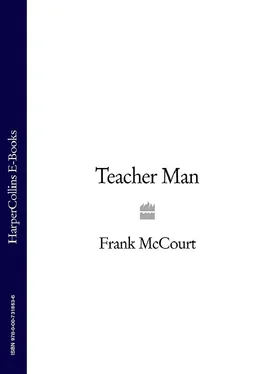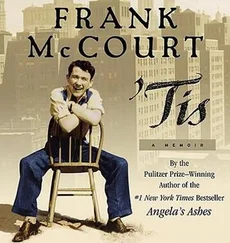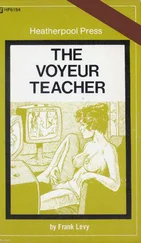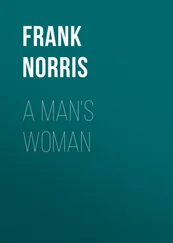Well, look. First the sandwich, now the sheep. Damn phone ringing off the hook. Parents up in arms. I have to cover my ass. You’re two days in the building and two days you’re in the soup. How do you do it? If you’ll excuse the expression you’re inclined to screw up a bit. Why the hell did you have to tell these kids about the sheep?
I’m sorry. They kept asking me questions, and I was exasperated. They were only trying to keep me away from the spelling list.
That’s it?
I thought the sheep thing was a bit funny at the time.
Oh, yeah, indeed. You standing there advocating bestiality. Thirteen parents are demanding you be fired. There are righteous people on Staten Island.
I was only joking.
No, young man. No jokes here. There’s a time and place. When you say something in class they take you seriously. You’re the teacher. You say you went out with sheep and they’re going to swallow every word. They don’t know the mating habits of the Irish.
I’m sorry.
This time I’ll let it go. I’ll tell the parents you’re just an Irish immigrant off the boat.
But I was born here.
Could you be quiet for one minute and listen while I save your life, huh? This time I’ll let it go. I won’t put a letter in your file. You don’t realize how serious it is to get a letter in your file. If you’ve got any ambition to rise in this system, principal, assistant principal, guidance counselor, the letter in the file will hold you back. It’s the start of the long downward slide.
Sir, I don’t want to be principal. I just want to teach.
Yeah, yeah. That’s what they all say. You’ll get over it. These kids will give you gray hair before you’re thirty.
It was clear I was not cut out to be the purposeful kind of teacher who brushed aside all questions, requests, complaints, to get on with the well-planned lesson. That would have reminded me of that school in Limerick where the lesson was king and we were nothing. I was already dreaming of a school where teachers were guides and mentors, not taskmasters. I didn’t have any particular philosophy of education except that I was uncomfortable with the bureaucrats, the higher-ups, who had escaped classrooms only to turn and bother the occupants of those classrooms, teachers and students. I never wanted to fill out their forms, follow their guidelines, administer their examinations, tolerate their snooping, adjust myself to their programs and courses of study.
If a principal had ever said, The class is yours, teacher. Do with it what you like, I would have said to my students, Push the chairs aside. Sit on the floor. Go to sleep.
What?
I said, Go to sleep.
Why?
Figure it out for yourself while you’re lying there on the floor.
They’d lie on the floor and some would drift off. There would be giggling as boy wriggled closer to girl. Sleepers would snore sweetly. I’d stretch out with them on the floor and ask if anyone knew a lullaby. I know a girl would start and others would join. A boy might say, Man, what if the principal walked in. Yeah. The lullaby continues, a murmur around the room. Mr. McCourt, when are we getting up? He’s told, Shush, man, and he shushes. The bell rings and they’re slow off the floor. They leave the room, relaxed and puzzled. Please don’t ask me why I’d have such a session. It must be the spirit that moves.
2
If you were in my classes in the early McKee days you would have seen a scrawny young man in his late twenties with unruly black hair, eyes that flared with a chronic infection, bad teeth and the hangdog look you see on immigrants in Ellis Island photographs or on pickpockets being arrested.
There were reasons for the hangdog look:
I was born in New York and taken to Ireland before I was four. I had three brothers. My father, an alcoholic, wild man, great patriot, ready always to die for Ireland, abandoned us when I was ten going on eleven. A baby sister died, twin boys died, two boys were born. My mother begged for food, clothing, and coal to boil water for the tea. Neighbors told her to place us in an orphanage, me and my brothers. No, no, never. The shame of it. She hung on. We grew. My brothers and I left school at fourteen, worked, dreamed of America and, one by one, sailed away. My mother followed with the youngest, expecting to live happily ever after. That’s what you’re supposed to do in America, but she never had a moment of happy-ever-after.
In New York I worked at menial and laboring jobs till I was drafted into the United States Army. After two years in Germany I went to college on the GI Bill to become a teacher. In college there were courses on literature and composition. There were courses on how to teach by professors who did not know how to teach.
So, Mr. McCourt, what was it like growing up in, you know, Ireland?
I’m twenty-seven years old, a new teacher, dipping into my past to satisfy these American teenagers, to keep them quiet and in their seats. I never thought my past would be so useful. Why would anyone want to know about my miserable life? Then I realize this is what my father did when he told us stories by the fire. He told us about men called seanachies who traveled the country telling the hundreds of stories they carried in their heads. People would let them warm themselves by the fire, offer them a drop, feed them whatever they were having themselves, listen to hours of story and song that seemed endless, give them a blanket or a sack to cover themselves on the bed of straw in the corner. If the seanachie needed love there might be an aging daughter available.
I argue with myself, You’re telling stories and you’re supposed to be teaching.
I am teaching. Storytelling is teaching.
Storytelling is a waste of time.
I can’t help it. I’m not good at lecturing.
You’re a fraud. You’re cheating our children.
They don’t seem to think so.
The poor kids don’t know.
I’m a teacher in an American school telling stories of my school days in Ireland. It’s a routine that softens them up in the unlikely event I might teach something solid from the curriculum.
One day, my schoolmaster joked that I looked like something the cat brought in. The class laughed. The master smiled with his great yellow horsey teeth and gobs of phlegm stirred and rattled in his gullet. My classmates took that as a laugh, and when they laughed with him I hated them. I hated the master, too, because I knew that for days to come I’d be known in the school yard as the one the cat brought in. If the master had made that remark about another boy I would have laughed, too, because I was as great a coward as the next one, terrified of the stick.
There was one boy in the class who did not laugh with everyone else: Billy Campbell. When the class laughed, Billy would stare straight ahead and the master would stare at him, waiting for him to be like everyone else. We waited for him to drag Billy from his seat, but he never did. I think the master admired him for his independence. I admired him, too, and wished I had his courage. It never came to me.
Boys in that Irish school mocked the American accent I had from New York. You can’t go away and leave your accent behind, and when they mock your accent you don’t know what to do or think or feel till the pushing starts and you know they’re trying to get a rise out of you. It’s you against forty boys from the lanes of Limerick and you can’t run, for if you do, you’ll be known as a sissy or a nancy boy the rest of your life. They call you gangster or redskin and then you fight and fight till someone hits you on the nose and you’re pumping blood all over your one shirt, which will get you into terrible trouble with your mother, who will leave her chair by the fire and give you a good clitther on the head for fighting at all. There’s no use trying to explain to your mother that you got all this blood from defending your American accent, which you have because of her in the first place. No, she’ll say, now she has to boil water and wash your bloody shirt and see if she can dry it before the fire so that you can have it for school tomorrow. She says nothing about the American accent that got you into trouble in the first place. But it’s all right because in a few months that accent will disappear to be replaced, thank God, with a Limerick accent anyone but my father would be proud of.
Читать дальше












